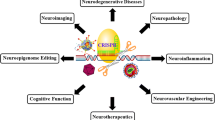
Overview
- Highlights how genome editing is enabling breakthroughs in how we study the brain
- Identifies a powerful method to understand and treat central nervous system disorders
- Reveals system-level insight into how the nervous system develops and functions
- Includes supplementary material: sn.pub/extras
Part of the book series: Research and Perspectives in Neurosciences (NEUROSCIENCE)
Buy print copy
Tax calculation will be finalised at checkout
About this book
This book is open access under a CC BY 4.0 license.
CRISPR-Cas9 is a rapid, efficient, versatile and relatively cheap method for dissecting the molecular pathways that are the basis of life, as well as for investigating and potentially rectifying faults in these pathways that result in disease.
This book reviews how CRISPR-Cas9 and other genome editing techniques are advancing our understanding of development and function in the nervous system, uncovering the molecular causes of neurological disorders and providing tools for gene therapy.
Similar content being viewed by others
Keywords
Table of contents (10 chapters)
-
Front Matter
Editors and Affiliations
About the editors
Fred Gage, Salk Institute for Biological Studies, La Jolla, CA, USA
Bibliographic Information
Book Title: Genome Editing in Neurosciences
Editors: Rudolf Jaenisch, Feng Zhang, Fred Gage
Series Title: Research and Perspectives in Neurosciences
DOI: https://doi.org/10.1007/978-3-319-60192-2
Publisher: Springer Cham
eBook Packages: Biomedical and Life Sciences, Biomedical and Life Sciences (R0)
Copyright Information: The Editor(s) (if applicable) and The Author(s) 2017
Hardcover ISBN: 978-3-319-60191-5Published: 22 September 2017
Softcover ISBN: 978-3-319-86801-1Published: 11 August 2018
eBook ISBN: 978-3-319-60192-2Published: 14 September 2017
Series ISSN: 0945-6082
Series E-ISSN: 2196-3096
Edition Number: 1
Number of Pages: XI, 123
Number of Illustrations: 16 illustrations in colour
Topics: Human Genetics, Neurosciences, Biomedical Engineering/Biotechnology



